Ep. 36 – Awakening from the Meaning Crisis – Religio/Perennial Problems/Reverse Eng. Enlightenment
(Sectioning and transcripts made by MeaningCrisis.co)
A Kind Donation
Transcript
Welcome back to awakening from the meaning crisis. So last time we were continuing our examination of sacredness, the experience of sacredness, the Schleiermacher side of things, and I was trying to develop an account of what symbols are – at least symbols insofar as they are distinct from signs – is a way of trying to understand the role that symbols have in our understanding of sacredness. So I was presenting to you the view that symbols are a participatory [-] act. And that that participation has a a connection to the activation of a profound kind of metaphor; by activating that metaphor we are reaching backwards through our exaptation and reactivating that material so that we can re-exapt our cognitive processes and re-experience re-appreciate re-see, re-understand some aspect of reality. And that re-exaptation makes the use of a symbol a deeply participatory, transformative thing that we do and that with a symbol we are activating all that exaptive machinery in order to hold something in mind so that we can see more deeply into it, be more in contact with it. And then I argued [that] the point of that is ultimately to set up an anagogic process by which I am transformed so I can see through the symbol into reality and so that reality can speak through the symbol to me, and that we get an anagogic flow happening, and I’m becoming deeply integrated, the world is becoming disclosed, and that mutual, reciprocal realization feels deeply like love coupling to reality in a profound way.
And so [I argued that] symbols are in that sense designed to get me into a trajectory of trans-framing; they’re designed to, in wonder, open op the world and also grow me so that I can be in that larger world. And that points to how symbols are ecstatic; they’re participatory, they’re integrative. They’re complex because they helped to complexify me and disclose the complexity of the world in a coordinated fashion. And then I suggested to you that we understand symbols as Mythos; that it’s always a symbol and a story together and that the story points to the ritual and the ritual is also… because the Mythos is always enacted if it’s going to bring about the transformations that it wants to bring about, or that we want to use it to bring about. I think both of those are right!
We can use Mythos to activate, accelerate, articulate, and appreciate Religio. Religio is inherently valuable to us so even that alone is going to be very valuable to us. But in addition, the act of seriously playing, not only is it developmental of what we find intrinsically valuable because it’s constitutive of our ability to value anything else or interact with anything we consider valuable – because it’s primordial – not only is that the case, but Relevance Realization – which is at the heart of Religio, and I’m giving you an argument for that – is constituted to it, it functions, it is structured to function, it functions by being interested in itself, correcting itself, transcending itself, developing itself. So that’s why we love the flow state, right? Not only is it optimal in this ‘playing with Religion’…/ like, the flow state is not only optimal in that it’s getting us to be our best, [but] we also find it to be an optimal experience because we’re seriously playing with this intrinsically valuable machinery in a way that is constituently, intrinsically significant to us. And I propose that when we are using the symbol to get us to play with the machinery, the Meta-assimilation, the Meta-accommodation of sacredness – or at least the Meta-assimilation, the Meta-accommodation of the higher order Relevance Realization within sacredness – then that’s what we deeply mean by the experience of Sacredness.
The New Proposal: Relevance Does Not Have An Essence
And then I propose to you a proposal I need to return to now. Because I only initiated it last time! I proposed to you that we move off of sacredness and onto the sacred, in a particular proposal as to what is the cause or the source of sacred-ness, “The Sacred”. And again, I’m using that term because it’s as neutral as I can find. And the proposal, which, again, you don’t find in some accounts of sacredness: The Sacred that is the Tao, I do not think is supernatural or absolute. The sacredness of Shenyata is definitely not! Right? So when Prince Wu asked Bodhidharma what was Holy about his doctrine, and he keeps pressing Bodhidharma and he keeps saying, “No, no, not that!” and then the Prince gets upset and says, “well, what is Holy about your doctrine?”, Bodhidharma says, “Nothing holy! Vast emptiness!”. Shunyata is, in that sense, sacred. But it is not Holy! At least not in the sense of a supernatural source of righteousness.
So I proposed an alternative to that idea, born from a critique. The critique was [that] there is something wrong about trying to essentialize ‘Sacredness’ in The Sacred. To say that the source of sacredness is something that is essentially relevant to us, absolutely unquestionably, undeniably relevant to us, and that it is the origin and the culmination of relevance. And then I proposed to you that that just struck me, ultimately – and I do mean this with as much respect as, I mean, this is, hopefully regarded as a respectful criticism, but nevertheless, it’s a criticism – I regard that as a category mistake. Relevance Realization is not about detecting, finding something that’s inherently relevant in the sense that it absolutely commands our attention. Relevance does not have an essence. It doesn’t work that way! Relevance Realization is, intrinsically, an evolving process. It functions by evolving and it evolves in its functioning. Does that mean we should just dispense? No, because I propose to you a couple [of things]. Well, I propose one thing and then I want to add another thing to it! I proposed to you that there’s a different way of thinking about sacredness that comports well with this idea of the of sacredness; there’s an idea, a way of thinking about the source of sacredness, that comports well with the picture of sacredness that I’ve tried to argue for which is, namely, the idea of sacredness as the inexhaustible. The inexhaustible aspects of this reality (knocks the wall and the desk).
It’s kind of like turning Kant on its head! This reality is always a source of wonder for me, not because there is an object that specifically or absolutely has the claim on me of being the source of wonder! Every object, every thing is combinatorially explosive: vast emptiness. Ultimately, there is a ‘no-thingness’ to reality because everything is combinatorially explosive in terms of what it is. But my processing, precisely because of the way it operates, has an inexhaustibleness to it too – a no-thingness to it! The “I” that is never reducible! There is always the framing that can never be captured in the frame because the process of Relevance Realization is ongoing, it’s inexhaustible because it can’t stop. It’s like a Shark that if it stops swimming, it drowns! And there’s a deep transjectivity, there’s a deep participatory identification between the inexhaustible no-thingness in me and the inexhaustible no-thingness of reality: vast emptiness. The Tao that can be spoken is not the Tao! …and so I can return again and again and again to the world. And again and again and again, there is the real potential in the world of sacredness.
Symbols As Being Indispensable
Now, why might people – now this is a conjecture on my part! I’m trying to offer an explanation and it is not intended to be a justification because that would be inconsistent with what I’m saying! – but why is it that we might get this way, where we get ‘this’ (uses his bottle as an example), this is where it is to be found! And this is where I think we do need to be more charitable. Oh man, and I don’t want to sound condescending!! There is a real sense in which particular symbols, particular Mythos is indispensable for people (writes indispensable on the board, with Mythos off it). It might be, and in fact it’s highly plausible if you think about it: given my own personal history, the way Relevance Realization has unfolded, the way Religio is for “here, now, me”, that certain symbols are indispensable for me to activate, articulate, appreciate, accelerate my Religio. Those symbols may be indispensable for me because of the way my Relevance Realization machinery is evolving. They may be indispensable to my Religio because of the Kairos that is always part of my ongoing – see, the problem with ‘Religio’ is it’s a Noun, right? – but my ongoing Religio – even saying ‘my’ is wrong!!! Right? Because that makes it sound like something I possess; the Religio that my world and I participated in and co-emerge from! It may be to a certain set of individuals that these sets of symbols are indispensable. That makes sense to me! That is how Relevance Realization works!
You may say that only through this Mythos (draws arrows through Mythos; Fig. 1 arrows), do I get the access I need to activate, accentuate, appreciate, accelerate, articulate my Religio. I think that is a completely plausible hypothesis. I think, therefore, it makes sense to say, for example, that given the way this person’s evolved fittedness has unfolded, and the particular timing – the historical context – that only this Mythos gives them the access they need. And in that sense – maybe it’s a Christian Mythos, maybe it’s a Hindu Mythos – that Mythos is indispensable to them. But here’s what we shouldn’t do. We shouldn’t confuse indispensable to an individual, to a community, to a group to a tradition. We shouldn’t confuse psycho-cultural, cognitive cultural indispensability with metaphysical necessity. Metaphysical necessity. English is indispensable to me; I cannot communicate to you without it! Given this time, this place, my own history, where we are, the timing of things, English is indispensable to me! That doesn’t mean that English is metaphysically necessary. It didn’t exist and it will not exist at some point. And it is not some final, complete or absolute version. It is not the perfect language. It is not the final language. In fact, it performs precisely because it’s continually evolving as a language so that it stays, at least to some degree, in touch with the world.
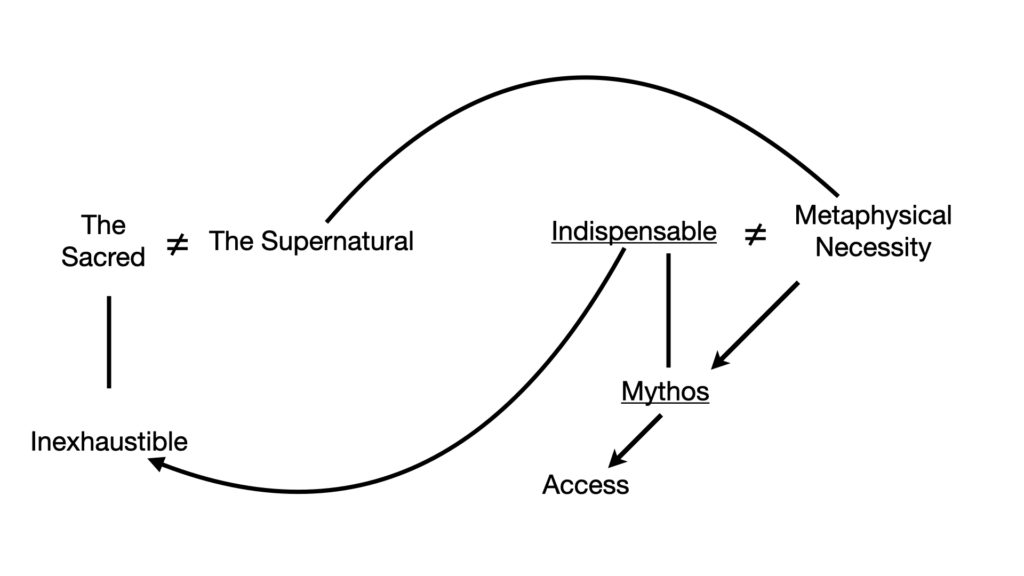
The First Step Towards Solving The Meaning Crisis
I don’t think we should confuse these (adds ≠ metaphysical necessity to the board); they are not the same. I do not think we should understand the sacred…/ We shouldn’t do ‘this’ (writes The Sacred ≠ The Supernatural). Of course, these are linked (links The Supernatural with Metaphysical Necessity). The inexhaustible source of perspectival, participatory, procedural, and ultimately propositional intelligibility (writes inexhaustible off The Sacred). (Connects Indispensable to inexhaustible) We may have, I think it’s reasonable that – in fact I think it’s highly plausible that – a certain Mythos is indispensable for an individual, a group, a community, a tradition. But that should not be confused with metaphysical necessity, nor should it license the idea that that inheres in some supernatural entity or thing (indicates the link between Metaphysical Necessity and The Supernatural). The shark, being the way the shark is, is indispensable to the sharks capacity to survival. But that doesn’t mean that that is the final finished absolute form of fittedness. The world and the capacity for biological adaptation, the process of evolution means that there’s an inexhaustibleness to life’s capacity for fittedness. That to me is a reasonable alternative to understanding sacredness, than to think of it as inhering in some final absolute.
So if we could give up the confusion of indispensability with metaphysical necessity, if we could give up identifying the sacred – that which generates sacredness – as the supernatural, then we would not have to be committed to a two world’s mythology for accessing sacredness, the deep connectedness of Religio! Now that in [and] of itself is not… well, that’s not the response to the Meaning Crisis! That’s insufficient! That is, and I mean this seriously: this is the first step! The first step is to try to understand the machinery of connectedness and understand it in a way that allows us to disconnect it from a metaphysical essentialism, disconnect it from the supernatural and its commitment to a two world’s mythology. Instead, understand it in a fashion that is completely integratable with science! Because if you remember, this is all grounded in a naturalistic interpretation of Relevance Realization. This would be an account that re-situates us back within that scientific worldview while also giving us a way – a deep way – of talking about, experiencing sacredness, deep connectedness, deep self-transcendence, deep transformation, et cetera. Now I need to do a lot more work. And that’s why this series is not yet finished! I need to show how this model of Relevance Realization does address the historical issues. I’ve already [been] suggesting that to you, but how does it help to address where we got to historically, the historical factors?
But there’s another thing that I’ve been alluding to, that we also have to address and they are integrated together. And now that I have this theoretical machinery, I can talk about it better (wipes board clean) because we now have, I think, a more careful way of understanding the meaning crisis (writes Meaning Crisis on the board). So we have, and we did this in the first half of the series, we have the historical factors (writes this off to the side of Meaning Crisis, pointing below it) that basically have un-homed us, thwarted a worldview attunement, all the stuff we’ve been talking about. And of course they need to be addressed. And part of how we can awaken from the meaning crisis is we have to respond to these historical factors. We have to come up with a way of re-articulating our worldview in which we can get back that sense of deep connectedness; what I’ve been calling, in the last couple of lectures, sacredness. That kind of deep connectedness that affords the satisfaction of our sense of being in contact with the world, affords self-transcendence, affords meaning in life in a profound way. So can this view give us something analogous to what the three orders [give]? We’ve got to get to that; that’s how we respond to the historical factors! But you’re starting to see how it might do that. We’re starting to see how we can get an account of sacredness that can fit into the scientific worldview and fit us back into it. We need to do more on that; you’re getting a beginning of that. But there’s something else now that’s coming to the fore that we need to address (adds another arrow, mirroring the one from Historical Factors), which is the structural functional analysis of meaning making – what I’ve been calling the scientific analysis, because I think that’s fair in contrast to the historical analysis – is also disclosing something else! And we’ve seen this all the way along and I’ve been hinting at it! Because the machinery of Meaning Making of course, also, is the machinery that is going awry when people are experiencing a sense of meaninglessness.
Perennial Problems
Remember the core argument that the very machinery that makes you adaptive is the machinery that makes you vulnerable to self deceptive, self-destructive processing. The very machinery of RR, Relevance Realization (indicates the convergence point between the two arrows, below Meaning Crisis), that is making all of this deep connectedness possible for us is also the machinery that can go horribly wrong. We’ve already seen that. I want to start talking about the perennial problems (labels the second arrow on the right with Perennial Problems). You’ve seen examples along the way, but I want to bring them out more. I want to develop that thesis about how the very machinery that makes us adaptive is the machinery that makes us prone to self deceptive, self-destructive behaviour. Here’s what I want to argue. I want to argue that all cultures, all people – all people in the sense of being participants in their culture, not necessarily every single individual – but all cultures, across time, place, history, right? People are prone to perennial problems. These are ways in which the machinery of Relevance Realization can drive them into meaninglessness, despair.
So the idea is that, inherent in the machinery that makes us adoptive, is inescapable vulnerabilities to self-deceptive, self-destructive patterns that can deeply undermine our Religio – the Agent:Arena relationship – such that we experience meaninglessness, absurdity, alienation, et cetera. We fall into despair. These are perennial because they are inherent in our machinery. Now, cultures – and individuals, communities, at multiple scales – what people have developed is they have developed sets of psycho-technologies (draws a big arrow back up towards Perennial Problems), ecologies of practices that help alleviate the suffering of these perennial problems. So for example, in India, you have the rise of Buddhism as a set of psycho-technologies for dealing with Duka, et cetera, dealing with modal confusion. This is, broadly, we have practices for cultivating wisdom and pursuing enlightenment or salvation (adds these to this big arrow). The meaning crisis emerges, I would argue, when historical factors have undermined – and that’s what I’ve tried to show you in the history – have undermined a worldview, a tradition; de-legitimised a language, a cognitive grammar; made obsolete or made dismissive practices, sets of psycho-technologies so that this (Historical Factors) undermines this (puts a big X through Wisdom, Enlightenment, Salvation – See Fig. 2). The historical factors lead to the undermining of the whole ecology of practices and psycho-technologies and cognitive cultural grammar that people have created in order to respond to the perennial problems.
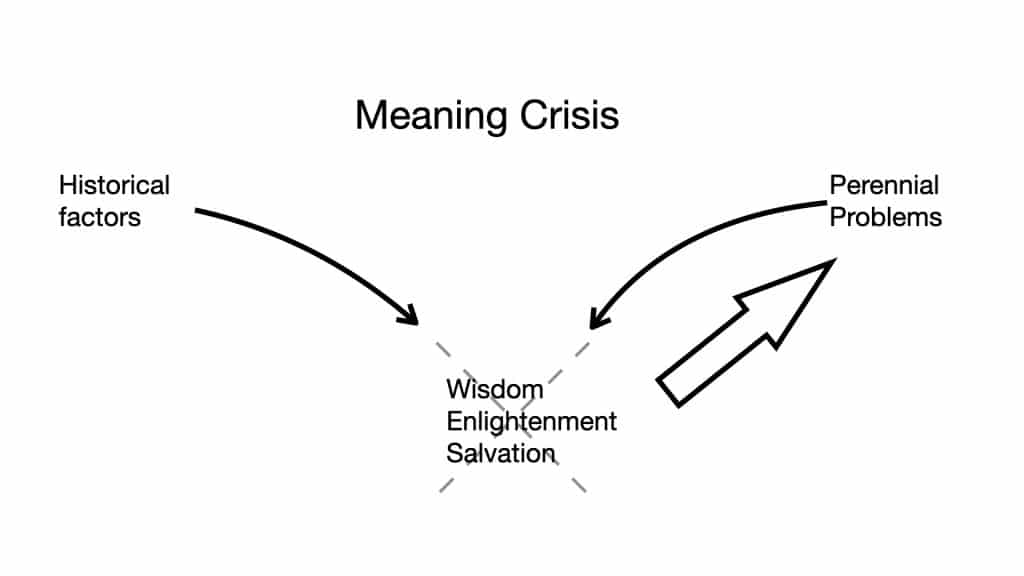
So we need to do two things. And now this is where we’re going to start drawing the historical and the scientific together. Is this account that I’m trying to argue for – for Relevance Realization as our meaning making machinery and for understanding sacredness in terms of Religio, a higher order form of Relevance Realization – can I also use that machinery to give – and I’ve tried to suggest how this is possible – to give a response to the historical factors? (See Fig. 3) I’m going to try and do that in terms of what’s called third generation or 4E Cognitive Science. And I’m already doing that! And I’ve already been exemplifying it to you throughout this course!
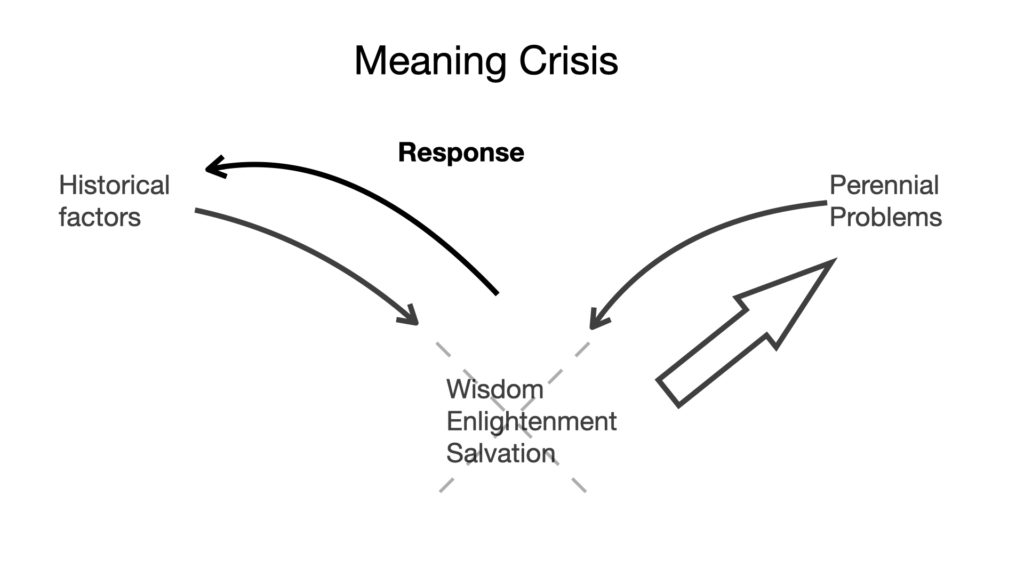
Reverse-Engineering Enlightenment
But right now I want to do something else. I want to take all this machinery of Relevance Realization (RR) and Religio and Sacredness (adds the circle – Fig. 4) and I want to use it to talk about how we can address the perennial problems.
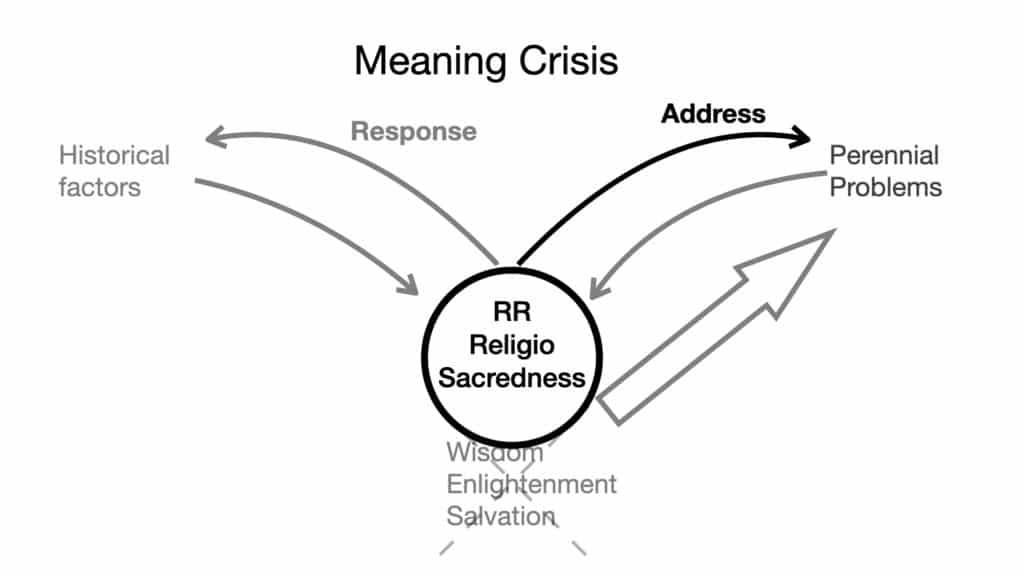
I want to do something that’s at the core of a cognitive scientific project. This sounds pretentious and maybe hubristic and I hope it’s not! I want to reverse-engineer enlightenment. I want to understand what the perennial problems are and using this machinery (indicates RR, Religio, Sacredness), what are the practices (indicates Wisdom, Enlightenment, Salvation), what are the processes we can use in order to address the perennial problems? In fact that’s what I’m going to take enlightenment to mean. Enlightenment is the set of practices that ameliorate the perennial problems and alleviate us from the distress and the suffering that they inflict upon us. I already suggested the possibility of that when we talked about higher States of consciousness and trying to give a cognitive scientific account. But now I want to take that deeper because to awaken from the meaning crisis is not just to have a theory. It is not even to have a good scientific historical theory. It is to have an understanding that helps afford and facilitate the process of transformation that we need to undergo in order to awaken from the meaning crisis. (Wipes board clean.)
I have failed if what I’m doing will not ultimately lead to ways in which you, in your life, can respond to how the perennial problems might be gnawing away at the fabric of meaning, in your life. So I want to concentrate on that. I want to concentrate on trying to reverse-engineer enlightenment, and then if I can take that and situate it into this account of sacredness and Relevance Realization and show how that fits into our scientific worldview – and you can see how this [is] potentially coming together – then we have a way of awakening from the meaning crisis. Not as an absolute final answer; that’s ridiculous! But as a way of maybe getting the process of awakening from the meaning crisis started.
All right, let’s think of Relevance Realization and Religio… We can think about [how] there’s a functional aspect, a structural aspect, and a developmental [aspect] (lists these three on the board – See Fig. 5a)). All of this has been seen throughout the series. Of course the functional aspect is ultimately the Relevance Realization [and] there [are] three central features [of this]: the way in which it is self-organizing, and then there’s aspects of self-identification and self-reflection. The structural has to do with the whole Meta-meaning of the Agent:Arena relationship. Developmental: I’ll come back to because I need to unpack these more (the above two) before I can talk more about that, but we’ve already seen how an intrinsically developmental Relevance Realization and Religio are.
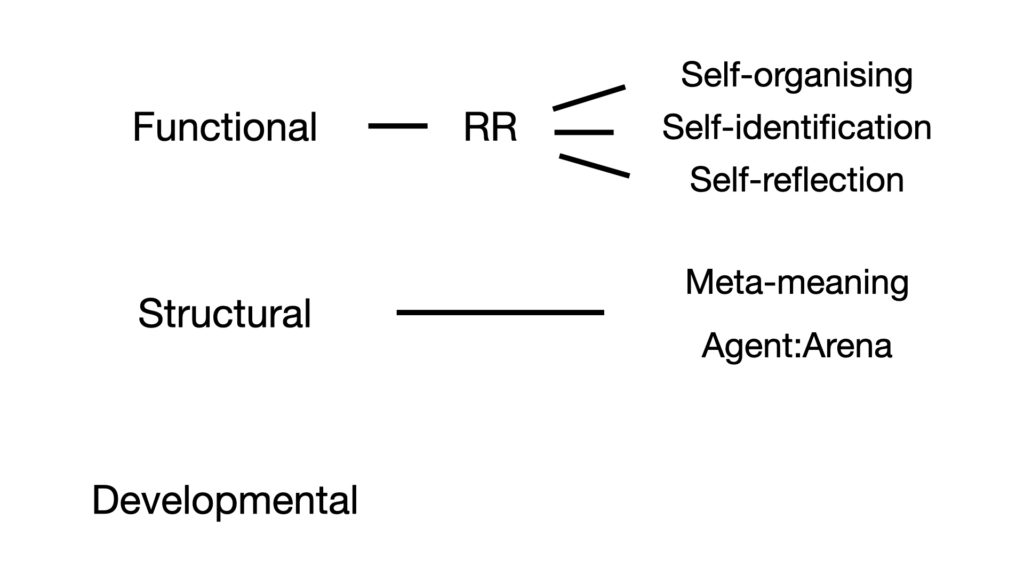
Okay, the self-organizing aspect. How can that go awry? Well, I’ve already made, I think, a very good case for that for you. That’s Parasitic Processing when we get into those complex cycles that take on a life of their own and take life from us; complex patterns of self-deception, and self-destruction. Self-identification: Well, we know what that is, that’s Modal Confusion. What about Self-reflection? Well, I haven’t talked about that very much, so I need to talk about that now.
The Problem Of The Reflectiveness Gap
This goes to some important work done by Velleman and others. So we have to go back again to the work of Harry Frankfurt and Frankfurt’s notion of a “Wanton”. A Wanton is a being who acts in a wanton fashion, that acts completely impulsively. And so the idea is if I just act completely impulsively, I’ll actually lose my agency because my impulses are often in conflict with each other, they undermine each other. Think about Plato and the inner conflict. So what I need to do is I need to step back and reflect in order to try and get a coordination and integration, and reflection actually helps reduce my wantonness. See when I’m enmeshed in a perspective – here’s a particular perspective (Fig. 6a) – I am enmeshed in it’s salience landscape, how it’s making me care, how it’s motivating and arousing me. So when I’m thirsty, I’m seeing the world ‘thirstily’ right? So things having to do with water [-] become salient and I’m drawn [to them]. That’s to see the world ‘thirstily’!
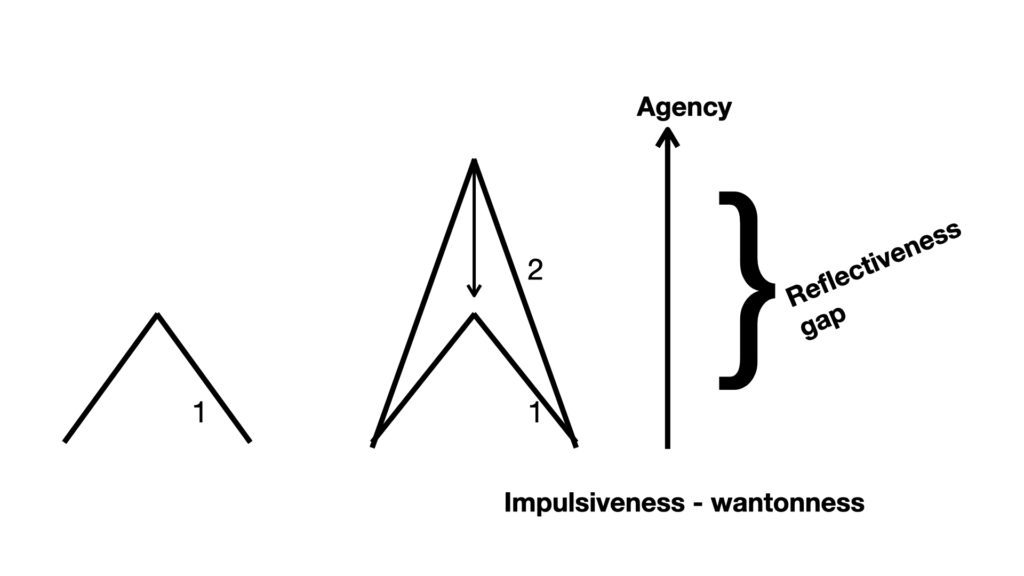
But I can do a transparency opacity shift. I can actually step to a different perspective in which I’m aware of my thirst (Fig. 6b). Now I’m not…/ this perspective is not thirsty (Fig. 6b 2). This is thirsty (Fig. 6b 1)! But this perspective (Fig. 6b 2), for example, is curious: “Oh, that’s what thirst is like!” Now my motivational machinery is not driven just by thirst. It is driven by, perhaps, curiosity! And what happens is I start to gain some relief from the compulsion of immediacy and urgency of my thirst. I’m using thirst, by the way, because that’s also a metaphor in Buddhism for craving. So if you’re at the bottom and if you don’t do any self-transcendence you are awash in impulsiveness, and self-destructive wantonness! And as I start to move up, away, as I self-transcend, I start to regain agency (Fig. 6c). But as you may expect, you can’t simply maximize this, and this is Velleman’s point and it’s an excellent point. As I open up, this is the reflectiveness gap. I get a gap by reflection. As I open up this reflectiveness gap, I’m gaining agency. But if I keep opening it up, do I keep enhancing agency? No, because then you get into the problem that is typified, beautifully by the way, in one of our great tragedies, namely Hamlet.
Hamlet is always reflecting and he’s always reflecting on his reflection. And so he’s always stepping back and looking at, always stepping back and looking at. And so he becomes incapable of acting! His tremendous – because he is gifted, right? – his tremendous powers of reflection and self-transcendence are actually making him incapable of acting. As Velleman says, he becomes disconnected from the motivational machinery of interacting with the world. He loses agency. See, as I open up – here’s Agency, here’s the Reflectiveness Gap (R.G.): as I opened it up, I gain Agency, but as I push it too far, I lose it (Fig. 7). Now, of course, you’re tempted to, you know, the Canadian response, “Oh, I’ll just stay in the middle!” (Fig. 7 m). And remember, that never works because how much I need to be towards this end and how much I need to be towards that end is going to be very contextually sensitive.
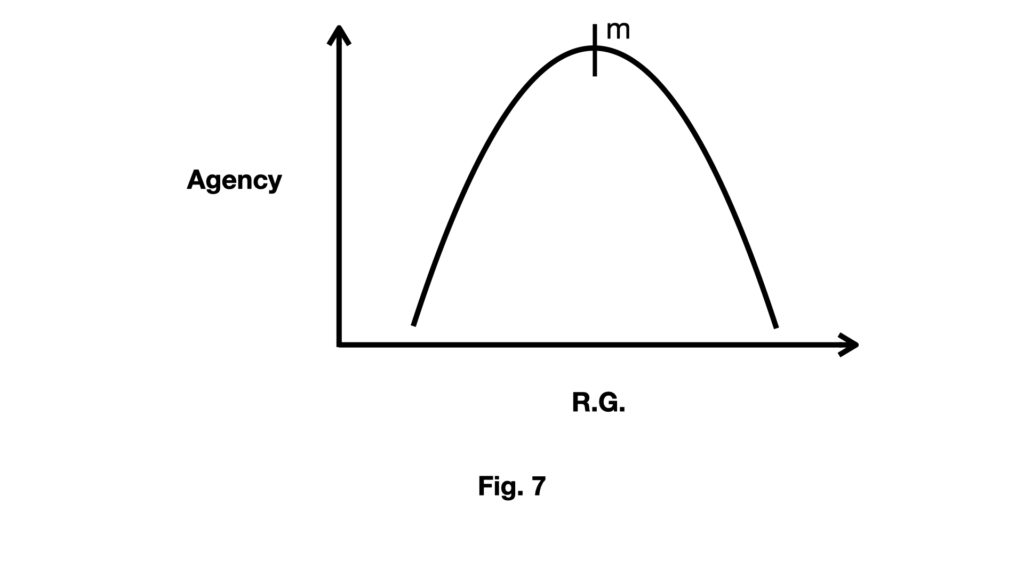
The problem with this is how do I optimise this? How do I get the involvement, the immersion of the wanton? How do I get the flexibility, the self-correcting capacity of Hamlet? How do I get them together? How do I optimise them together? So this is the problem of the Reflectiveness Gap (adds this to Fig. 5 – see fig. 5b)
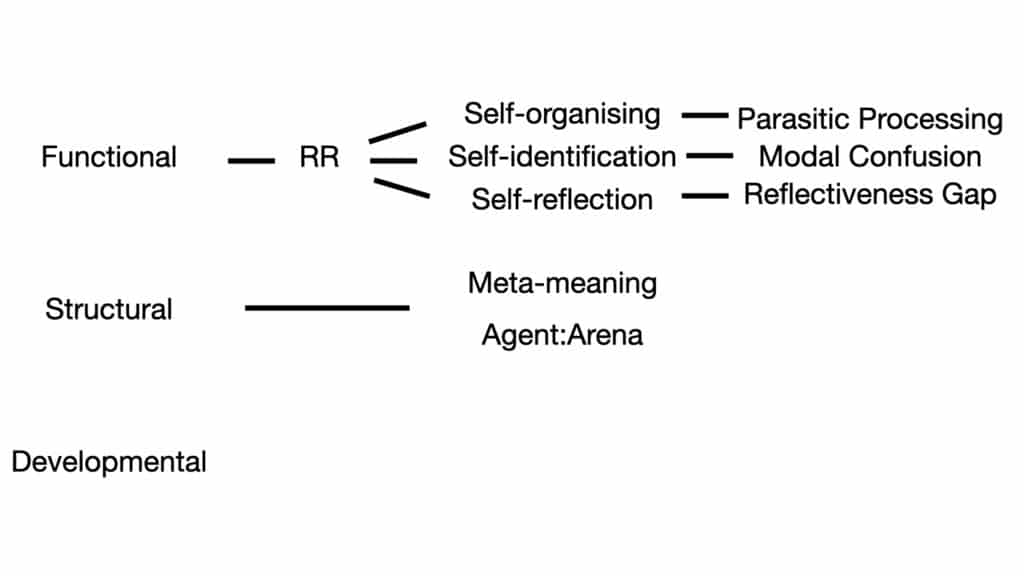
And of course, the fact that it’s an optimization problem tells you that it’s immediately enmeshed with Relevance Realization because another trade off that…/ remember, there’s trade offs, we’ve seen, between exploring and exploiting. There is trade offs between generalising and specialising. Another trade off is [when] you’re constantly trading between stepping back and looking at your cognition to monitor it and stepping through and being involved with intervening in the world. There’s a trade off relationship between them. It’s also part of Relevance Realization.
What about Meta-meaning? Well, there’s three I want to talk about: absurdity. We’ve talked about [-] this one already: anxiety. Alienation (adds these to the board – Fig. 5c). All of these, of course, show up in Domicide, because Domicide is the loss of the Agent:Arena relationship.
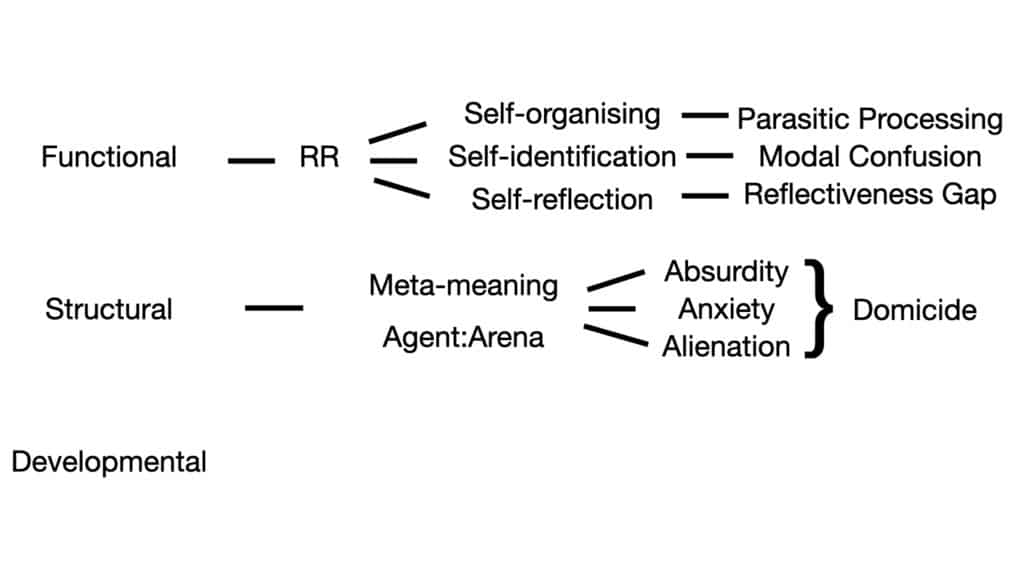
So alienation is when the connectedness between you and other people is lost. Absurdity is when the connectedness between you and the world is lost and absurdity can be pushed into horror. When you’re finding a particular absurdity deeply mysterious, so it’s drawing you in [-] such that your ability to make sense and get a grip on the world is being deeply thwarted. That’s horror! And of course anxiety… remember, it’s not the same as fear. Anxiety is ultimately when you are disconnected from yourself in an important way.
The two problems we face down here (Developmental) are ones we’ve talked [about] already before. This is existential inertia; when you’re trapped in a worldview and you can’t get out of it, you can’t activate Anagoge and move to a new worldview. Or existential ignorance; you’re indecisive, you don’t know what you’re going to lose if you go through the transformation, you don’t know what you’re going to miss if you don’t! This is existential entrapment (Fig. 5d)
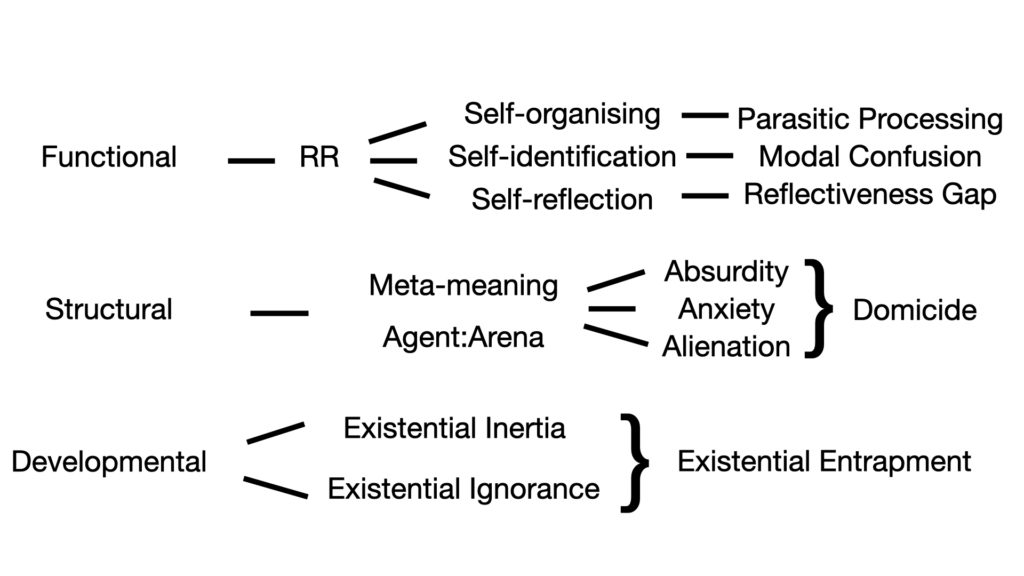
Absurdity
So let’s talk a little bit about [Absurdity]. I talked a lot about [Parasitic Processing] and [Modal Confusion], I explained [Reflectiveness Gap]. We know a lot about anxiety, the inner conflict. We’ve got aspects of the alienation I’ve been talking about. I’ve talked about [Existential Entrapment] already. But [Absurdity], which I’ve alluded to many times, we need to talk about this because it points to something really central and important. A very important article on this is by Thomas Nagel, it’s called The Absurd. It’s also talked about in his book, The View From Nowhere. And what I want to try and show you is how much absurdity is a perspectival, participatory [knowing]. All of this (Fig. 5d) is at the level of perspectival, participatory knowing, but [Absurdity] in particular. First of all, Nagel does something very, very important in the absurd. He talks about how we behave as if the absurd is a result of our inferential processing. And we purport to give arguments that lead to the conclusion of absurdity. So we give an argument like, “Well, what I do now doesn’t matter because it won’t make any difference to people a million years from now!” This is [the] “I’m made insignificant by the vast expanse of time”. And Nagel points out that that argument doesn’t work because if what’s happening now is irrelevant – notice my language – to people a million years from now, the symmetry applies. Their opinion of me a million years in the future is irrelevant to me! It is [-] a symmetry. If I make no difference to them, they also should make no difference to me! It can’t matter to me cause I can’t matter to it.
“Well, you know, what, what people are pointing to is, you know, they, you know, they’re so small. They’re so brief!” Well, Nagel says, “Well, if you existed for millions and millions of years, would that make your life more meaningful? In fact, isn’t it a very real possibility that existing for a very long period of time would make your life absolutely absurd!?” If your smallness in reality makes you feel absurd, makes you insignificant, then would your life be more meaningful to you if I blew you up to the size of a galaxy? Why would that do anything? And as [Susan] Wolf has argued in her book, Meaning In Life And Why It Matters, this sense of being bigger is actually a metaphor for being connected to something larger than oneself. And that’s ultimately a metaphor for being connected to something that has a value independent of my valuing of it. And we’re going to come back to that because that’s at the core of sacredness. Because there’s a problem for all of these (gesturing to the whole board – Fig. 5d).
So what’s going on with absurdity? If it’s not really being generated by these arguments, what are the arguments doing? Well, he’s basically saying the arguments are after the fact expressions of absurdity, not before the fact generators of absurdity. “Well, I might, you know, Whoa, my life is made absurd by the fact that I’m going to die!” You can’t experience being dead! How can that be relevant to you? “Well, I won’t exist!” You didn’t exist a million years ago! Is that particularly relevant to you? Now notice what I’m doing: I’m not trivialising your experience, I’m trying to say that the arguments aren’t generating it because the arguments are ultimately invalid. So let’s drop out of propositional knowing. And don’t we know that that’s right? We’ve had this whole argument that Relevance Realization, the meaning making processes, are below the propositional level, below the level of our inferences and our beliefs. It’s at the level of procedural and ultimately perspectival and participatory knowing.
Let’s take an example. So Nagel gives an example. Now he wrote the article in the 80’s, and that was way before cell phones and people had voice recorders, which is a very different time! A very, very different time! But he gives the example of what he calls everyday absurdity and the example goes like this: Tom is on the phone and he calls – he’s been all day just, “ahhhh, I got to do this, I gotta do this. I’m going to call Susan. I’m going to tell her that I love her. I’ve gotta do it. I’ve been working on this all day here…” working himself up and it’s “Ohhhhh, [-] we got a friendship, but I might be losing a friendship, but I might be gaining a lover…” and all this is happening (Fig. 5), right? So he picks up and calls, Susan, dials, he hears the phone picked up, click, and he goes, “Susan, don’t say anything. Don’t say anything at all! Before you can say anything I have to tell you, I love you. I love you, Susan!” And then he hears, “Susan is not here right now. Please leave a message. Beeeeep!” and it’s kind of funny and it’s kind of sad at the same time!
And humour has… humour can overlap with absurdity! In fact, you can get a lot of humour by playing with absurdity: Monty Python, you know, [-] those guys, that troop was talented in that! Because what’s going on in humour points to what’s going on in absurdity. What’s happening is a clash of perspectives. We have Tom’s perspective, and from within his perspective, his action is deeply meaningful. But the machine gives us an impersonal, mechanical perspective in which his actions make no sense. They have no meaning. Absurdity is a clash of perspectives. Because, of course, that’s why it overlaps with humour because in humour, what you do is you play between a clash of perspectives and then you resolve it by a trick, by an equivocation. You play with two different perspectives. That’s why it’s a punchline. You were in this perspective, and then you’re suddenly shifted to this one! But not in some incongruous way; in a way that you can ultimately make sense of. But of course, absurdity doesn’t always, and very often does not overlap with humour because the perspectival clash can be one that we can’t ultimately resolve with humour and make sense of. The clash instead is a raw clash of perspectives. And we experienced just the incoherency, just the loss of connectedness. So absurdity is this clash of perspectives. That’s why it can become horror! Because this perspective (gestures a small ball), the perspective that I’m looking at, if I look at this perspective, from the perspective of all of time in history (gestures a massive ball), what’s relevant here (small), is undermined there (massive). There’s a clash in these perspectives.
So what do we need to do? We can see how all of this machinery, all of this (Fig. 5), is ways in which the adaptive nature of Religio and Relevance Realization is also making us prey to, vulnerable to losing our agency, to suffering distress, to experiencing horror, meaninglessness, absurdity, being trapped, being deeply confused, overwhelmed by parasitic processing… These are perennial problems because the very machinery that is making us adaptive is making us always susceptible to them. We can’t jump over our own shadows.
Now, what I want to do next time with you is, can we use the very same machinery of Relevance Realization and see how we could engineer a comprehensive response to all of these perennial problems? Because I would propose to you that any developmental change, any development of our perspectival, participatory and procedural knowings that affords a response, a reliable response that ameliorates and even alleviates the perennial problems, [then] that is a good candidate for enlightenment. Instead of making enlightenment as this unachievable superlative that only the superhuman beings in the distant past can achieve… What’s the use of that? Let’s make enlightenment what it… It might be difficult, but let’s not do “that”. Let’s acknowledge the difficulty with an understanding that actually facilitates us being able to respond. Let’s… I’m going to stipulate that enlightenment is the developmental process that gives us reliable amelioration and alleviation of the perennial problems.
And I’m going to show you next time, how that can be explained with the theoretical machinery of Relevance Realization, and Religion. Thank you very much for your time and attention.
– END –
Ep. 36 – Notes
To keep this site running, we are an Amazon Associate where we earn from qualifying purchases
JD Velleman
“What about Self-reflection? Well, I haven’t talked about that very much, so I need to talk about that now. This goes to some important work done by Velleman”
Plenty of books on Amazon!!
On Being Me: A Personal Invitation to Philosophy – Buy Here
Beyond Price: Essays on Birth and Death – Buy Here
Self to Self: Selected Essays – Buy Here
Harry Frankfurt
Harry Gordon Frankfurt is an American philosopher. He is professor emeritus of philosophy at Princeton University, where he taught from 1990 until 2002. Frankfurt has also taught at Yale University, Rockefeller University, and Ohio State University.
Thomas Nagel
“A very important article on this is by Thomas Nagel, it’s called the absurd. It also talks about in his book, the view from nowhere”
Thomas Nagel is an American philosopher. He is a University Professor of Philosophy and Law, Emeritus, at New York University, where he taught from 1980 to 2016. His main areas of philosophical interest are legal philosophy, political philosophy, and ethics.
The View From Nowhere – Buy Here
Susan Rose Wolf
“And as [Susan] Wolf has argued in her book, Meaning In Life And Why It Matters”
Susan Rose Wolf is an American moral philosopher and philosopher of action who is currently the Edna J. Koury Professor of Philosophy at the University of North Carolina at Chapel Hill. She taught previously at Johns Hopkins University, the University of Maryland and Harvard University.
Meaning in Life and Why It Matters:: 40 (The University Center for Human Values Series) – Buy Here
Other helpful resources about this episode:
Notes on Bevry
Additional Notes on Bevry


